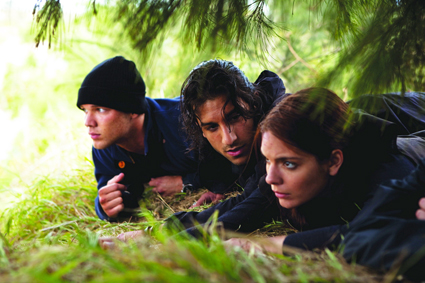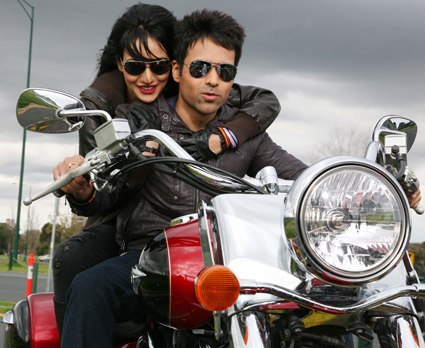alternate-universe australia
jake wilson: tomorrow, when the war began; crook

Tomorrow, When the War Began
“GET READY. THIS IS REAL. THIS IS TRUE.” SO READS THE BLURB ON MY BATTERED PAPERBACK COPY OF TOMORROW, WHEN THE WAR BEGAN, JOHN MARSDEN’S RIPPING YARN FROM 1993 ABOUT A BAND OF TEENAGE GUERRILLAS DEFENDING THEIR HOME TURF. ONE OF THE MOST POPULAR AUSTRALIAN ‘YOUNG ADULT’ NOVELS OF ALL TIME, TOMORROW SPAWNED NINE SEQUELS AND HAS NOW MORPHED INTO A BIG-SCREEN ACTION-ADVENTURE THAT MARKS THE DIRECTING DEBUT OF STUART BEATTIE—ANOTHER LOCAL HERO, WHOSE HOLLYWOOD SCREENWRITING CREDITS INCLUDE THE FIRST PIRATES OF THE CARIBBEAN (2003) AS WELL AS COLLATERAL (2004).
Marsden’s book and Beattie’s film share a simple, irresistible premise: seven high school friends—three boys, four girls—go camping in the bush outside their country town, in an Edenic secret valley ironically known as “Hell.” On their return, they find that everything has changed: power lines have been cut, dogs slaughtered, family members are nowhere to be found. Australia is at war with an unnamed country and these kids just happen to be at ground zero of the attack.
In both book and film, the trick is that the invasion is equally a nightmare and a wish-fulfilment dream. Marsden’s novel combines derring-do and soap-opera romance with open-ended moral inquiry, catering to his readership’s yearning for maturity while proposing anguish over bloodshed as part of the price. Beattie adheres to a simpler version of the same coming-of-age formula: “I want to do more, see more, I want to be more,” Corrie (Rachel Hurd-Wood) tells the protagonist Ellie (Caitlin Stasey) early on, never guessing how swiftly her prayers will be answered.
From Marsden’s perspective, Ellie and her mates aren’t so distant from, say, the gang in Buffy the Vampire Slayer, using jokey camaraderie to fend off darkness without and within. Far more streamlined and externalised, Beattie’s outwardly faithful adaptation is closer to Home and Away with guns. Where Marsden refuses easy philosophical solutions, Beattie’s slant is straightforwardly Darwinian: Ellie may express guilt over the death of an enemy her own age, but this is merely a character beat, a step on the transformative journey to adulthood.
Struggling to manufacture chemistry between his actors in the awkward dialogue scenes, Beattie is more at ease with a convention familiar from horror cinema, whereby pent-up emotions are relieved in bursts of cathartic violence. Unlike her counterpart in the novel, Corrie announces at the outset that she’s had sex with her boyfriend Kevin (Lincoln Lewis), a ‘loss of innocence’ that irrationally seems to trigger the destruction of her cosy childhood world. By contrast, Ellie remains a tough virgin resembling the Final Girl in a slasher flick—though keeping the franchise possibilities in mind, Beattie avoids bumping off any of his leads.
Jingoistic speeches are kept to a minimum, and we’re briefly reminded that the mainly Anglo heroes are themselves the beneficiaries of an earlier invasion. Not quite dog-whistle cinema, Tomorrow still serves its purpose as ideological propaganda, in the vein of recruiting advertisements (“The Army – The Edge”) that continue to screen regularly in Australian multiplexes. Beattie’s exploitation of the teen-soldier gimmick recalls both John Milius’ World War Three adventure Red Dawn (1984) and Paul Verhoeven’s sci-fi satire Starship Troopers (1997); while in plot terms the invaders of Tomorrow could be replaced by extra-terrestrial bugs, the point of the exercise lies in bringing the fantasy back home, letting us view an outlandish scenario as potentially ‘real.’
There’s little doubt that this frightening yet enticing prospect matches the national mood in an era when “border security” is not only an election issue but the title of a top-rating reality show. Back in the pre-Howard days, John Marsden felt obliged to cover his tracks by refusing to specify the origins of his bad guys, as well as assigning a central heroic role to a Thai-Vietnamese character (played here by Chris Pang). For his part, Beattie unambiguously portrays the invading army as Asian, a decision he has justified in interviews by noting that geography limits his options: “Why would New Zealand invade Australia? It doesn’t make sense.” No, indeed—but with China or Indonesia, it’s presumably a different story.

Crook: It’s Good to Be Bad
The boot is on the other foot in Mohit Suri’s Crook: It’s Good To Be Bad, another paranoid fantasy of an alternate-universe Australia torn apart by racial warfare. Already a Bollywood veteran at twenty-eight, Suri shot part of the film in Melbourne last year, inspired (if that’s the word) by attacks on Indian students that gave the city the kind of media profile money can’t buy. Predictably, the film’s eventual release in Australia was beaten up into a minor controversy: “Bollywood Movie Paints Melbourne As Racist,” announced a disapproving headline on the ABC news website. Had those cheeky sub-continentals gone too far?
Or not far enough? A typical Bollywood melange of song, comedy and melodrama, Crook (like Tomorrow) exploits an attention-getting theme while disavowing any goals beyond the unimpeachable one of ‘entertainment.’ The initial comic sequences in Mumbai introduce us to Jai Dixit (Emraan Hashmi), a larrikin packed off to Australia by his uncle (Gulshan Grover) in order to get him out of the DVD piracy game. But his eye for the main chance remains undimmed: after an effort to impersonate a scholarship student, he settles for pursuing the beautiful radio presenter Suhani (Neha Sharma), though it’s unclear if he cares more for her personal attractions or her Australian citizenship.
As Jai explores his new surroundings, Crook idles in first gear for half an hour or more, reinforcing a dubious image of Melbourne as a sporty city by the bay that harks back to the touristic glamour of Siddarth Anand’s Salaam Namaste (2005). Suhani inexplicably lives in a million-dollar mansion with ocean views, while Jai joins a group of expatriates in a purple bungalow complete with backyard swimming pool, at the end of a suburban cul-de-sac with an inner-city nightclub just round the corner.
Jai’s quest to win over Suhani is complicated by her firebrand brother Samarth (Arjan Bajwa), a racial separatist who denounces Australia as a decadent land of former convicts and rampant pre-marital sex. Jai himself is more susceptible to the lure of the mysterious West, finding a secondary romantic prospect in a bottle-blonde stripper (Sheila Allen) with a troublesome brother of her own (Francis Michael Chouler). Just to complicate the film’s racial politics, a handful of scenes were shot with Cape Town doubling for Melbourne, and both these representative Aussies speak in what seem to be South African accents.
Meanwhile, student bashings are on the rise, with the connivance of at least some members of the Australian Police. For a few moments the film takes on the appearance of an agitprop documentary as Indian activists gather in protest, though collective struggle holds little interest for the stubbornly individualistic Jai. For my money, the highlight of Crook comes immediately before interval, when the hero slips away from a brawl and races desperately towards Flinders Street Station—just as Ava Gardner did all those years ago in On the Beach (1959).
Thereafter, the narrative goes haywire: the nightclub burns down, a major character is revealed as a serial killer, and the city looks set for a full-scale riot unless our feckless hero manages to mend his ways and convince us all to get along. Lurid but not ill-natured, Crook ultimately goes out of its way to propose a moral equivalency between Anglo and Indian bigots (other ethnicities hardly get a look-in) while depending like Beattie’s film on a strictly enforced opposition between ‘us’ and ‘them.’ What Asia will make of Tomorrow, When the War Began is anyone’s guess, but Melbournians may be legitimately perturbed that their city has become an internationally recognised byword for prejudice: even a distorting mirror can reveal genuine faults.
Tomorrow, When the War Began, director, writer Stuart Beattie, novel John Marsden, cinematography Ben Nott, editor Marcus D’Arcy, production design Robert Webb; Crook: It’s Good To Be Bad, director, story, Mohit Suri, script Ankur Tewari, music Pritam, producer Mukesh Bhatt
RealTime issue #100 Dec-Jan 2010 pg. 15






